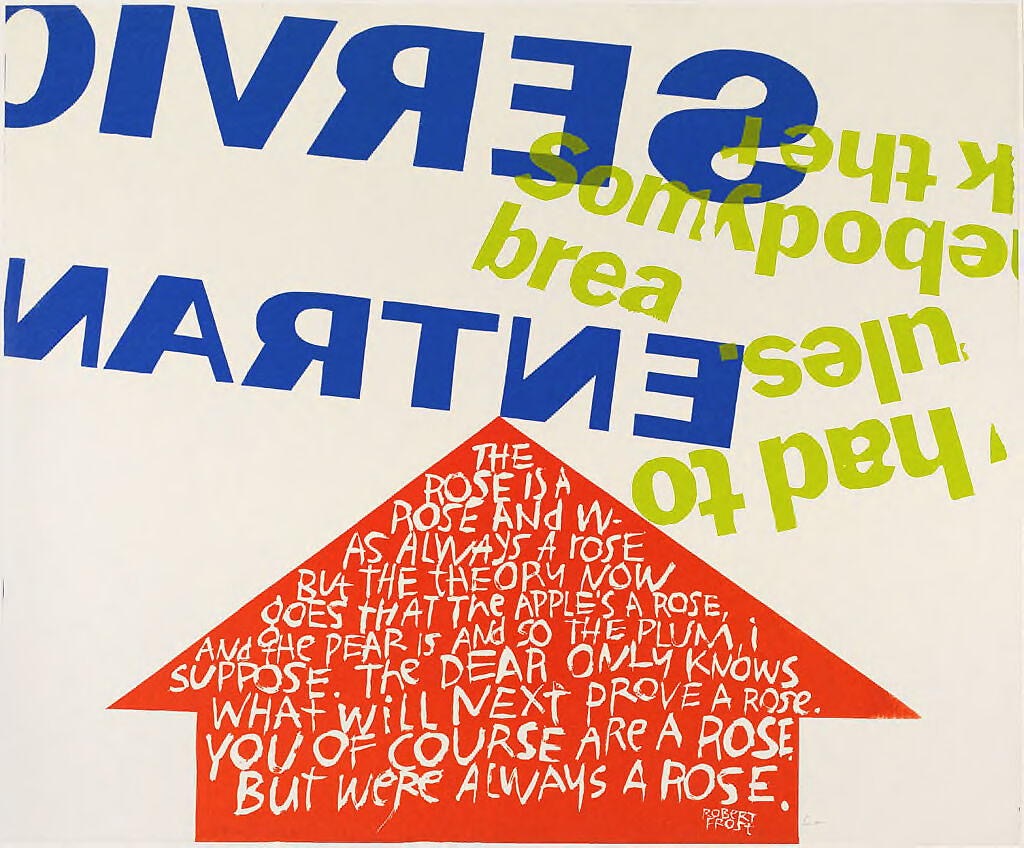GoldenRules

Corita Kent (Sister Mary Corita):
somebody had to break the rules (1967)
Screen print
The printed text reads: SERVIC[E] ENTRAN[CE] / somebody had to break the rules / The rose is a rose and was always a rose but the theory now goes that apple's a rose, and the pear is and so the plum, i suppose. The dear only knows what will next prove a rose. You of course are a rose. But were always a rose. Robert Frost
Credit Line: Harvard Art Museums/Fogg Museum, Margaret Fisher Fund
Copyright © Courtesy of the Corita Art Center, Immaculate Heart Community, Los Angeles / Artists Rights Society (ARS), New York
"I wonder every morning how I should live."
The question remains open regardless of how often it's answered: How should I live? It might be better understood to wonder, 'How should I live now?' because, with shifting contexts and ever-accumulating experiences, one's response might reasonably change over time. The aspiration to answer this question once and for all might be universal, for it's as inherently unsettling of a question as it is also apparently definitively unanswerable. I have caught myself getting glib in the face of it, resorting to some Hallmark® Card homily as if that might dispatch the troubling issue. I try to do unto others as I'd prefer them to do unto me, The Golden Rule, even though I know not everyone might appreciate what I’d warmly receive. I considered The Platinum Rule an improvement—to do unto others what they want to have done unto them—until I realized that I rarely have access to what others want to have done unto them. I'm not omniscient. Further, even if I knew focusing on their bare want could quickly get me into trouble or violate my own better intentions. I wouldn't want to supply drugs to a person with an addiction to satisfy some Platinum Rule.
The forms of these rules never change. They seem prescriptive to a fault, which might be why they don’t work in every circumstance and need changing from context to context. Not every condition can be improved by a prescription. Some apparent shortfalls don't require much of a response. Sometimes, the best way to live involves doing nothing in response to some insult. Hunger might be cured by feasting or fasting, though neither response permanently cures the underlying condition.
My friend Mark G. Gray recently sent me his most recent essay, a study of The Golden Rule. [Golden Rules, 8/08/2024] He observed that we need this sort of guidance because of the intolerable condition under which we live. We must kill to live. However squeamish we might be, we remain utterly dependent upon something dying so that we might survive. Even the vegetarian murders plants and lives by what Mark calls The Wooden Rule: if an action results in killing something, then that action is always wrong. Vegans make even finer distinctions between animals and plants and might perceive human life itself at root a sin, responding by meditating or isolating, refusing to actively participate in any fuller range of human activity, and that's okay. We must each answer the question however we feel we must. Otherwise, we seem to become less than fully human, even when our answer severely limits our involvement in life.
Another rule has been gaining popularity lately, the Iron Rule, which states that if one is mightier than another, it is right to do any action to the other. This rule might be God's because the prevalent Western religions all seem to employ this rule instead of any more loving one. This rule justifies dominion, and if my Sunday mornings were filled with Iron Rule doctrine, I might feel justified in assuming responsibility for administering vengeance myself. I might see a world populated by lesser peoples— unbelievers—and seek to improve humanity's averages by disenfranchising them. The underlying idea of democracy seems offensive to any Iron Rule adherent. Equality becomes a disenfranchising fiction. Charity becomes wasted placation. Understanding, a weakness. Acceptance, a fatal flaw.
The current presidential race seems to be between an Iron Rule/Bronze Rule faction and what I might refer to as The Blind Rule one. The Bronze Rule insists that if another has done an action to me, I am justified to do that same action unto them: eye for an eye equality. The Blind Rule counsels everyone to mind their own damned business. The Silver Rule holds situational promise, for it insists that I not do unto others what I wouldn't want done to myself. All rules seem hard and fast, for none seem to cover every possible situation, but they also seem alluringly efficient. My self-esteem soars when I catch myself actually practicing The Golden Rule. I have been counseled, though, that it's generally better if I can ask the recipient whether they want the gift I would want someone to do unto me. Surprisingly, not everybody appreciates the loving care with which I almost always inflict my preferences upon them.
I'm still killing. So are you. Our original sin qualifies as our original feature. We innoculate against what we imagine will be the worst, but even worse and also better eventually intrude. However generously we choose our rules, they sometimes sure seem golden and other times more like shit. We dare not deny that we are all murderers, some perhaps aspiring to become angels. That we continue trying seems essential. I operate to a tarnished ruleset, maybe copper, possibly tin. I wonder every morning how I should live, and every morning I answer again.
©2024 by David A. Schmaltz - all rights reserved


